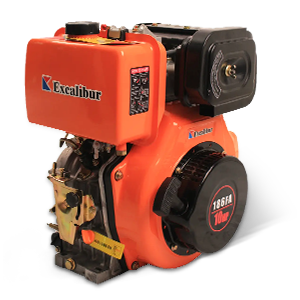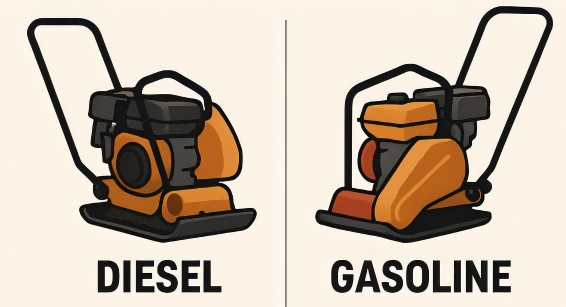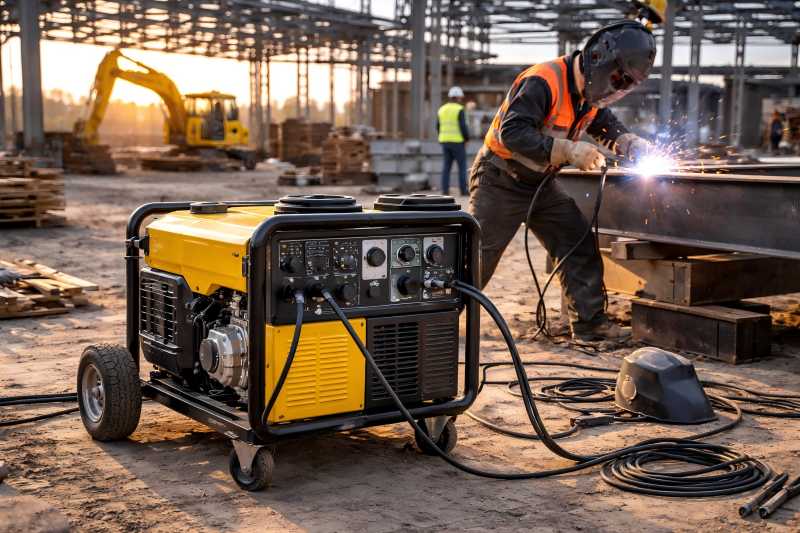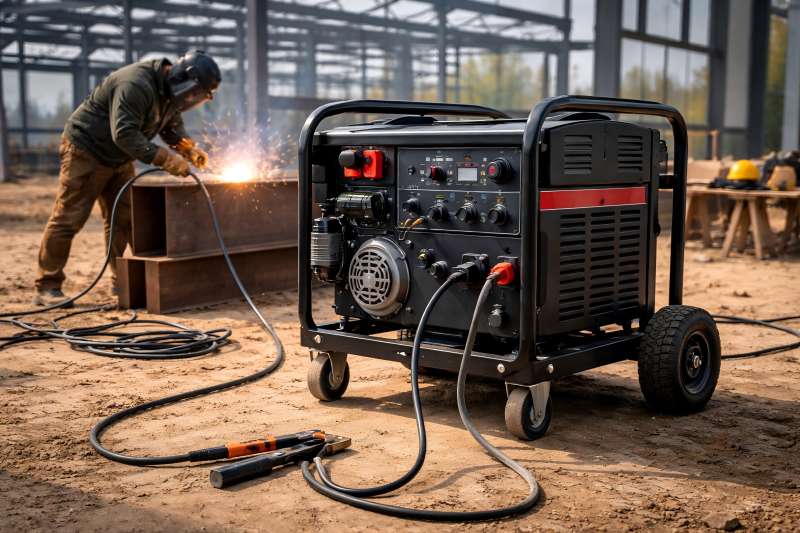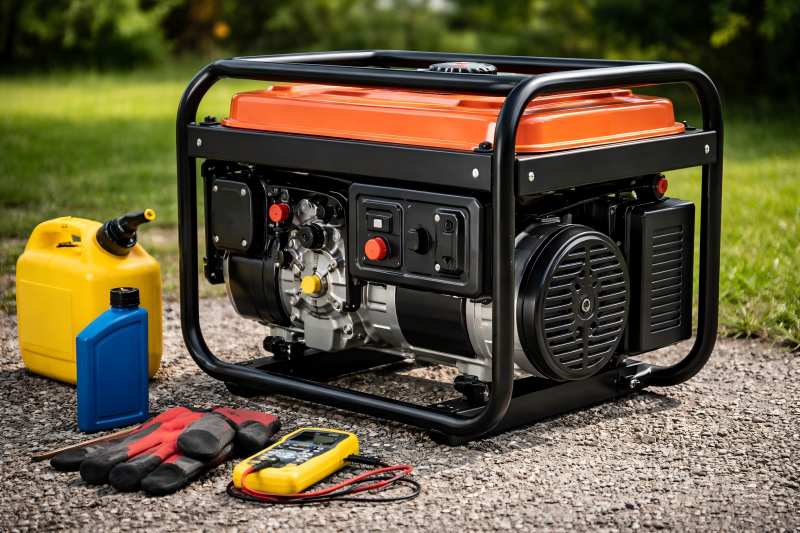In the realm of soil compaction, plate compactors stand as an essential tool for construction professionals, landscapers, and roadwork teams. At the heart of these machines lies the engine—a critical component that determines not only performance and durability but also fuel efficiency and long-term operating cost. Among the most debated topics in the compaction equipment industry is the choice between diesel and gasoline-powered plate compactors. Which is more efficient? Which one should a contractor choose?
As a manufacturer of high-performance plate compactors, we understand that fuel type is a key factor in selecting the right compaction solution for your business.
Role of Fuel in Plate Compactor Performance
The primary function of a plate compactor is to exert high vibratory force on soil, gravel, or asphalt through rapid plate movement. This process requires consistent power, torque, and vibration frequency—all of which are driven by the engine. The choice of fuel—diesel or gasoline—significantly influences:
- Compaction power and depth
- Runtime per fuel fill
- Fuel consumption rate
- Maintenance frequency
- Machine lifespan
- Total cost of ownership
Thus, evaluating fuel efficiency goes beyond fuel cost per liter. It includes energy conversion, torque stability, operating duration, and equipment longevity.
Fuel Energy Density: Diesel Packs More Punch
Diesel fuel has a higher energy density than gasoline—roughly 35.8 MJ/L for diesel compared to 34.2 MJ/L for gasoline. Although the difference seems small, diesel engines typically convert this energy into power more efficiently.
Diesel engines operate on compression ignition, which allows them to convert a larger portion of fuel energy into mechanical work. As a result, diesel plate compactors often deliver higher torque at lower RPM, meaning they can achieve the same or better compaction results while consuming less fuel per hour.
Key Takeaway:
If you’re focused on getting more compaction per liter of fuel, diesel engines generally offer better fuel efficiency in energy output.
Engine Efficiency in Real-World Applications
While fuel energy density matters, real-world efficiency is about how the engine performs during long, intensive use.
Diesel Plate Compactors:
- Provide more torque, especially under heavy loads or dense materials.
- Maintain engine strength over longer work sessions.
- Tend to have a lower RPM range, reducing wear and fuel consumption.
Gasoline Plate Compactors:
- Start faster and easier, especially in colder weather.
- Deliver smoother operation with less vibration to the operator.
- They are better suited for intermittent use or lighter-duty tasks.
In terms of hourly fuel consumption, diesel compactors typically burn 10–20% less fuel than their gasoline counterparts for similar tasks. This leads to meaningful fuel cost savings over time, especially in projects requiring continuous operation.
Maintenance and Longevity: Diesel Takes the Lead
Maintenance is another angle where fuel efficiency reveals itself over time. In order to endure greater compression forces, diesel engines are constructed with greater durability. This design allows diesel plate compactors to last longer in harsh conditions, with fewer engine failures.
Diesel Advantages:
- Longer engine life
- Fewer tune-ups
- Better durability in dusty, hot environments
- Reduced oil usage every hour
Gasoline Tradeoffs:
- Features a straightforward engine structure for quick and easy servicing
- Less durable under continuous or high-stress operating conditions
- Requires more regular replacement of oil and spark plugs for optimal performance
While gasoline engines may seem easier to service, diesel engines tend to run more hours between overhauls and need fewer major replacements. This contributes to long-term efficiency in ownership.
Noise, Vibration, and Emissions: Gasoline Is Quieter, Cleaner
Fuel is not the only factor in efficiency. Environmental effects and operator comfort are also taken into account.
- Noise: Diesel engines are noisier due to higher compression than gasoline. In urban settings, gasoline compactors are more comfortable to operate and quieter.
- Vibration: Diesel engines often generate more vibration, which may cause operator fatigue over long shifts. Gasoline engines tend to offer smoother operation.
- Emissions: Gasoline burns cleaner than diesel, producing fewer particulates. However, modern diesel engines with filters and catalytic converters are closing the gap.
If you’re working in noise-sensitive or low-emission zones, gasoline may be more practical. However, for remote or industrial job sites, diesel remains a strong choice.
Fuel Availability and Safety
Fuel availability plays a practical role, especially in remote locations.
- Diesel is widely available in most construction zones and can often be delivered in bulk for larger fleets.
- Gasoline is more accessible in residential areas and easier to store for small contractors.
Safety-wise, diesel is less flammable than gasoline, making diesel compactors safer for high-heat operations or transportation in bulk. This characteristic often makes diesel the preferred choice on large-scale construction sites.
Cost of Fuel and Operation
While diesel fuel can sometimes cost more per gallon than gasoline, its lower consumption rate and longer engine life generally lead to a lower cost per operating hour.
Let’s consider a rough comparative calculation for an 8-hour workday:
| Metric | Diesel Plate Compactor | Gasoline Plate Compactor |
| Fuel Consumption/hour | 1.0 L | 1.2 L |
| Fuel Cost/L (est.) | $1.30 | $1.15 |
| Daily Fuel Cost | $10.40 | $11.04 |
| Weekly (5 days) Fuel Cost | $52.00 | $55.20 |
| Monthly (20 days) Fuel Cost | $208.00 | $220.80 |
Over 12 months of use, that’s $153.60 in annual fuel savings per machine. When operating a fleet of 10 machines, this translates to over $1,500 saved annually, not including lower maintenance and longer engine life.
Weight and Transportability
Fuel type can indirectly affect the overall weight of the compactor.
- Diesel engines are heavier, leading to heavier plate compactors. This can be a benefit in achieving deeper compaction but makes transport and maneuvering slightly more difficult.
- Gasoline engines are lighter, making the unit easier to handle, especially in landscaping or residential tasks.
If portability is key, gasoline has an edge. For industrial-grade compaction, the extra weight of diesel becomes an advantage.
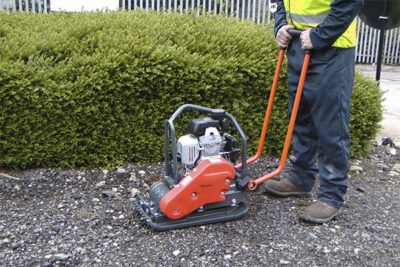
Application-Based Recommendations
When to Choose Diesel Plate Compactors:
- Long work hours with minimal breaks
- Industrial or road construction jobs
- Heavy, dense soil and aggregate compaction
- Work in hot, dusty environments
- Large fleets requiring long-term ROI
When to Choose Gasoline Plate Compactors:
- Light-duty, residential, or landscape tasks
- Intermittent use or short-duration jobs
- Urban projects requiring low noise
- Teams needing lightweight, portable equipment
- Entry-level or small contractors
Which Is More Fuel Efficient?
When judging fuel efficiency strictly in terms of fuel consumption, torque output, durability, and long-term cost, the diesel plate compactor comes out ahead. It provides:
- Greater torque per unit of fuel
- Lower fuel consumption per hour
- Longer engine lifespan
- Fewer breakdowns in heavy-duty operations
However, if your definition of efficiency includes ease of use, startup time, noise reduction, and initial cost, then gasoline compactors offer practical advantages—especially for smaller contractors or light-use cases.
Both diesel and gasoline plate compactors have earned their place in the construction and landscaping industries. The choice depends on your application, operating hours, worksite conditions, and long-term investment goals.
From a manufacturer’s perspective, we recommend diesel engines for clients seeking maximum compaction efficiency and long-term ROI, particularly in large-scale or demanding projects. On the other hand, our gasoline-powered compactors serve as lightweight, cost-effective solutions ideal for quick jobs and smaller teams.
Choose your fuel type wisely—because the right engine in your plate compactor doesn’t just move soil; it drives your business forward.

